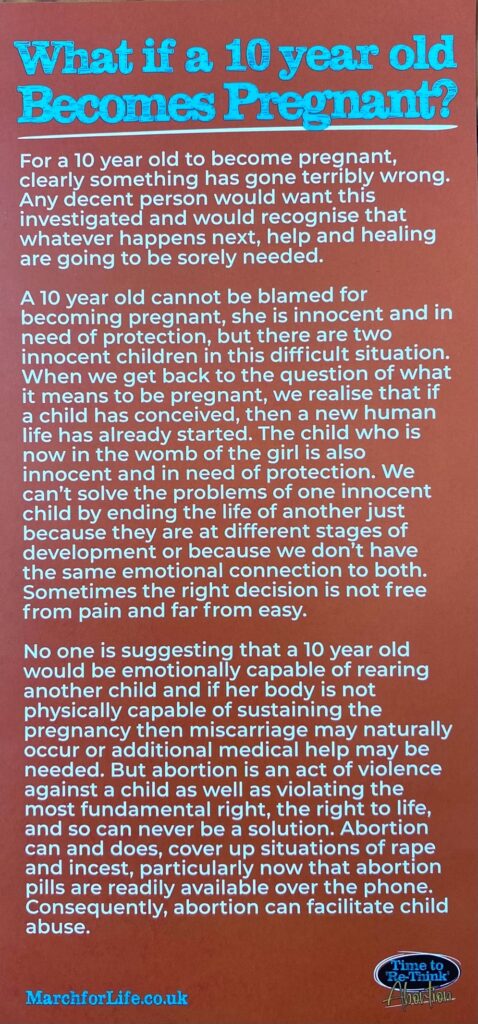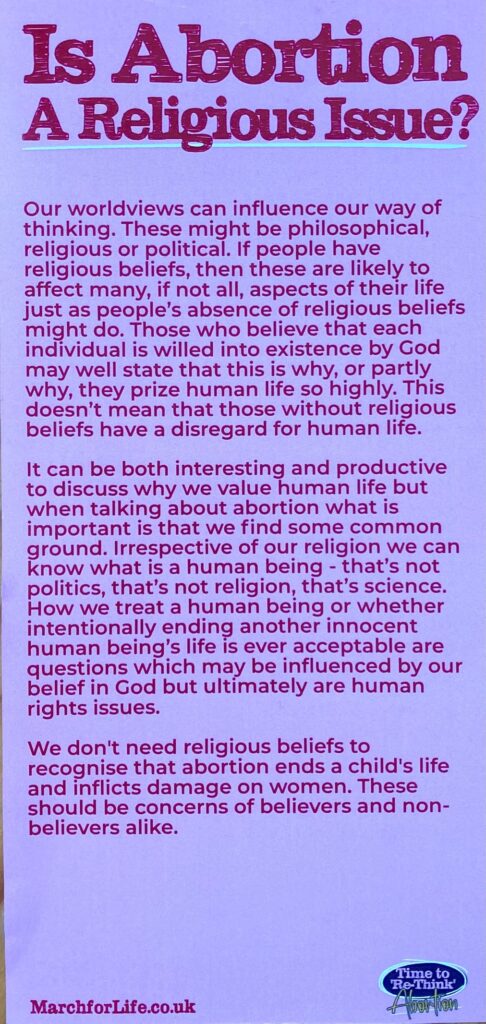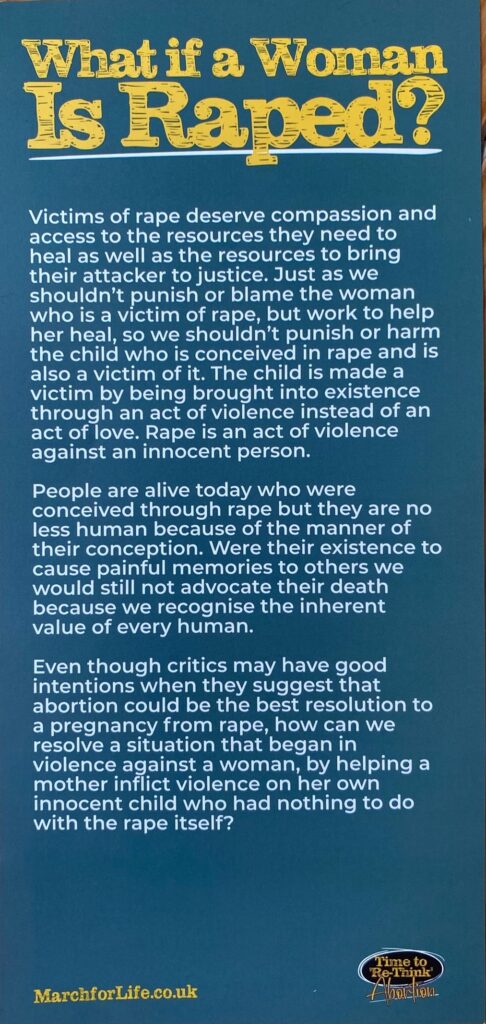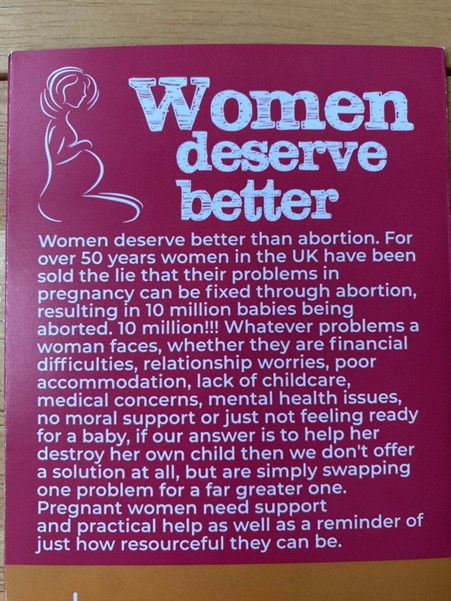Earlier this month, I went undercover to attend March for Life UK’s annual ‘pro-life’ conference at the Emmanuel Centre in Westminster. It was my second year attending; last year, I felt that the conference groups consisted of exactly who you would imagine would be at an anti-abortion conference, with an almost-comic precision: a collection of fringe groups either promoting alternatives to hormone-disrupting birth control, nuns handing out rosary beads, and young men desperately trying to bring American-style evangelicalism to the UK.
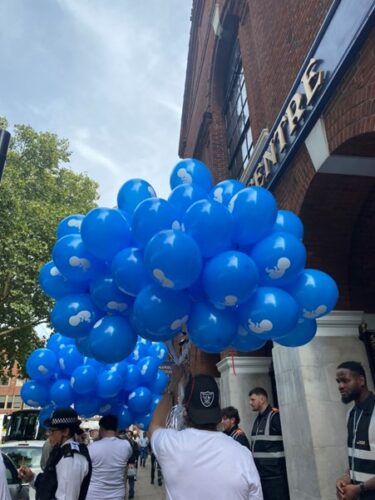
When the chance came up to attend again this year, I was curious to see if and how the movement and the messaging had changed. And to assess whether, as in the US, the ‘pro-life’ movement is gaining momentum in the UK. Also, attending for the second time, I wanted to understand more about where they feel the movement currently is, and where it can go next. More confident about what I was walking into this year, I went alone and determined to use as much honey as I could muster to catch as many wasps as possible.
I entered past robed monks holding balloons printed with pictures of foetuses. The hall was ahead, the speakers were upstairs, the tables occupied by various ‘pro-life’ associations, off to the right.
I decided to settle in by listening to a few talks while finishing my coffee. I watched as Rachel from Rachel’s Vineyard, a ‘Healing After Abortion’ weekend retreat, set the tone by speaking from her own experience. She explained that, when a woman has multiple abortions, she is “repeating the trauma” as a way of justifying the act.
She was followed by a few frustrated complaints from the panel about “secularism in our judicial system” and how Christians are not “stepping up”. One panellist went on a lengthy tangent about how prayer rooms in airports are called “multi-faith rooms” yet are “only used by Muslims”, as an example – that I imagine sounded better in the shower – of how Christians are not making themselves visible enough. The panel then eventually returned to the original point and closed with the mantra: “if there’s a heartbeat there’s hope.”
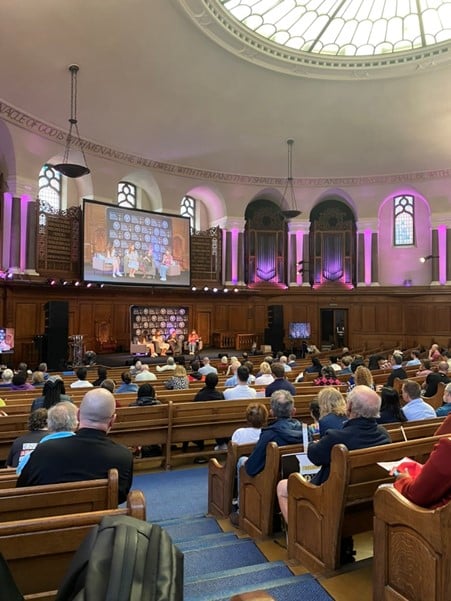
Once the panel and my coffee were done, I decided it was time to speak to some of the exhibitors, making my way into the room filled with stalls and tables and stands. I started with a representative from March for Life itself. Seeing that I was young, she helped me with how to go about evangelising the ‘pro-life’ cause. Her advice was to start conversations with those on the fence by asking the question: “What does it mean to be pregnant?” She was very open about how I should keep pressing this question until the person I’m speaking to eventually says something along the lines of “to have a baby inside you.” At that gotcha moment, I should respond with “exactly,” and then follow with: “what does it mean to end the life of that living, growing baby?”
To her, that was the argument won, and she then directed me to all manner of pamphlets covering every predicted question I might face. Reading through them quickly brought home just what I was up against. The pamphlets advised, for example, what to do when faced with a common argument against ‘pro-life’, which is what happens if a child becomes pregnant? She told me that such an argument should be met with: “There are two innocent children in this difficult situation,” and “the child who is now in the womb of the girl is also innocent and in need of protection,” concluding that one should not fight violence with violence.
From my first stall, I realised that leveraging my youth and presenting myself as new to their movement was an effective way to maximise the information I received, so I brought that method to the next group. 40 Days for Life is a Catholic organisation founded in Texas, named after their calling-card stunt of praying outside abortion centres for 24 hours a day over 40 days during Lent. Since the creation of their organisation, their stunts have spread to over 250 cities across the US, and a dozen across the UK and Ireland. There I spoke with a very kind representative and her fifteen-year-old daughter.
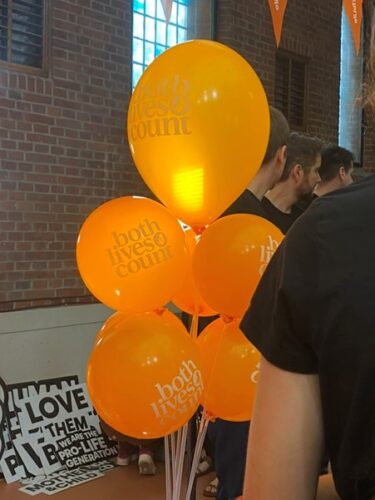
The representative complained about the limitations placed on their group’s protest work by the buffer zone laws introduced in the UK last year. These laws make it illegal for anyone to attempt to influence a person’s decision to use abortion services within 150 metres of any clinic. With my face already starting to ache from smiling, I feigned ignorance and asked what a buffer zone was. She explained the 150-metre rule, and when I asked why it existed, she replied that they were simply too effective and had proved “bad for business.” I found her rationale that funny and sad in equal measure: funny that she saw sanctions placed on the intimidation and harassment of women as a consequence of her being just too good at what she does, but then immediately sad for having met a true believer who, alongside her daughter, were truly cocooned within their skewed view.
Moving from one buffer-zone conversation to another, I spotted an opening at the ADF (Alliance Defending Freedom) stall. I made a beeline for it, having seen their name come up repeatedly as the legal representatives of Isabel Vaughan-Spruce, co-organiser of March for Life, who was publicly arrested last year for breaching the 150-metre limit.
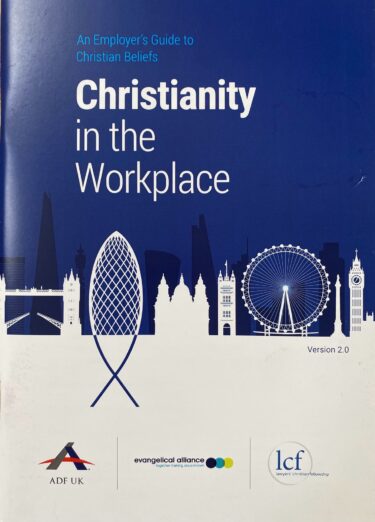
The man I made eye contact with as I approached was about my age. I went in and, after introductions, quickly tried to deepen the conversation with a little added flattery. He described the ADF as legal representation for freedom of speech advocates and, after I giggled and called him “basically a super-lawyer” (putting my dignity on the line for journalism here), he began bragging about what a big organisation he was part of, claiming they were singlehandedly responsible for the overturning of Roe v. Wade in the US and that they were making waves over here by representing and making an example of Vaughan-Spruce, and others like her.
That claim about Roe v. Wade is an exaggerated version of the truth. The ADF wasn’t the lead legal counsel, but it was a force behind the decades-long strategy to overturn Roe, influencing judicial appointments and running programmes like the one the man I spoke to was on, cultivating a network of conservative legal professionals and helping to lay the groundwork.
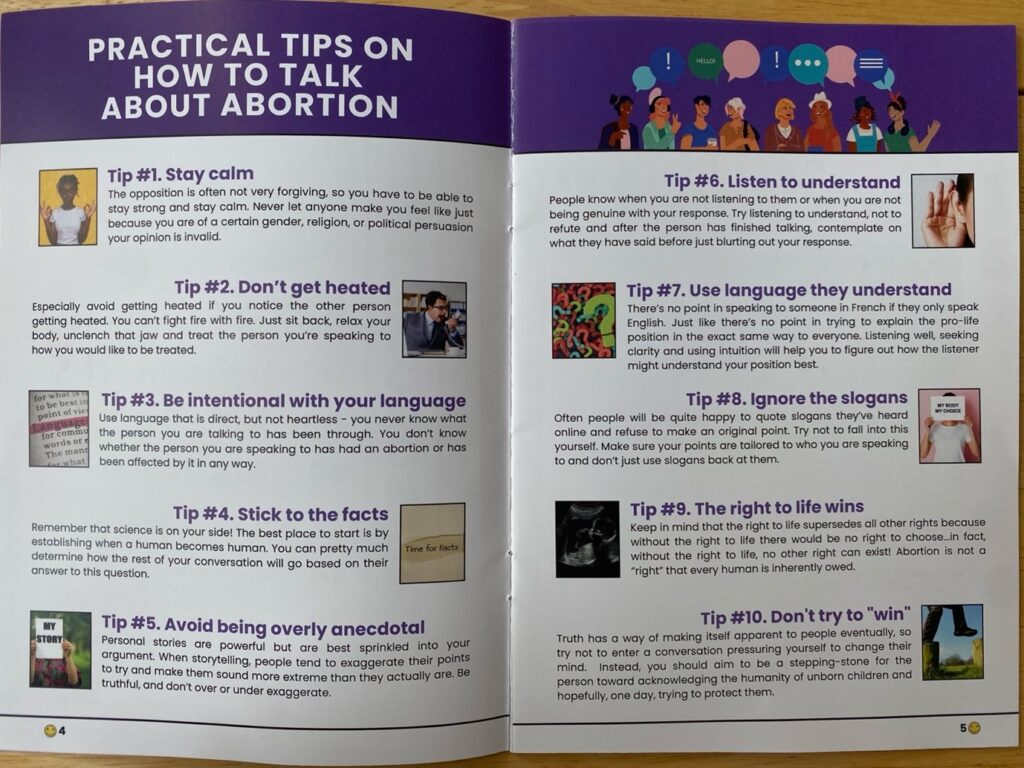
I have to admit I was naïve about the influence of the ADF. Designated a hate group by the Southern Poverty Law Centre, they have supported every piece of anti-LGBTQ legislation you can think of, and some I hadn’t heard of – such as defending state-enforced sterilisation for trans people. They support and actively lobby for enough to make your eyes water, and the SPLC describes them as “one of the most influential groups informing the [Trump] administration’s attack on LGBTQ rights.”
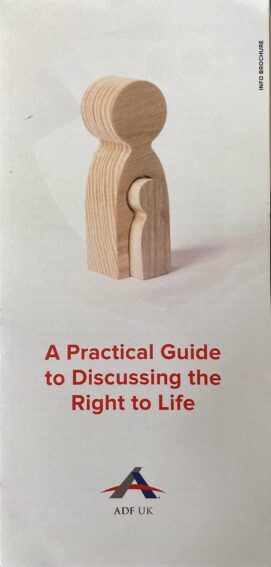
This has cast my conversation with their representative in a new light. Having an organisation with US success present this year, when it wasn’t last year, suggests the UK may not be immune to US strategy or its outcomes. At least, that’s what they like to think.
When the ADF representative spoke about Isabel Vaughan-Spruce as one of their clients, it was clear he was proud to be representing her. In fact, she appeared as a recurring figure throughout the day, often mentioned as an example of action. She is very much perceived as their Emmeline Pankhurst figure, doing deeds, not just saying words.
After leaving the ADF, I came to a group where I felt on more familiar ground: PASE, or Post Abortion Support for Everyone, who are exactly what you would imagine. They were one of two religious support groups for those affected by abortion, alongside Rachel’s Vineyard. PASE offers an eight-week course (price undisclosed) for healing from trauma and bereavement following abortion.
The PASE representative asked me if I knew someone who had had an abortion. I replied truthfully that I did, and she handed me a leaflet, urging me to share the love of Jesus with them, and perhaps pass on the course information so they could heal. There was an assumption that my friend must not know God, or else they would never have had an abortion – ironically, both she and her partner are devout Christians who find space for abortion within their faith. When I asked my friend for her opinion on this, she told me that everyone is a sinner, and that to her the whole point of being Christian was not to never sin but to come into a relationship with God as you are. She said, “I don’t believe God wants any kind of suffering, and he isn’t angry about human decisions.”
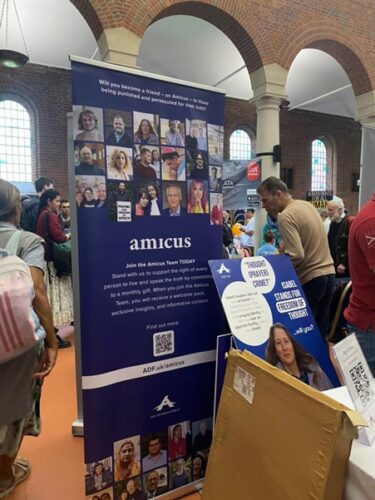
It’s interesting for me to reflect on the different viewpoints from the two Christians, remembering that not all Christians are ‘pro-life’. It has really put the puritanical shame narrative so present in the conversations at the conference into perspective. I do believe that the March for Life sees themselves as forgiving and kind Christians, but my friend’s point about God not wanting suffering seems at odds with these people, who are all for making a 10-year-old carry their foetus to term. PASE could be a service offering support to women who have had an abortion, and could seem to be the most empathetic group in the room, but their push for recognition of sin and the need for repentance and forgiveness creates, in my opinion, infinitely more suffering than any abortion.
Finally, I paid a visit to Abortion Resistance, which claimed to be the only secular organisation in the room, and met who I presumed to be the only other atheist present. Abortion Resistance is a ‘pro-life’ group run by young people for young people. The man I spoke to told me, without prompting, that he was coming at this from a “faithless” perspective, and I did a poor job of masking my surprise. When I asked how he had found the movement without religion, he said he came from a “political and moral perspective,” leaving me to fill in the gaps.
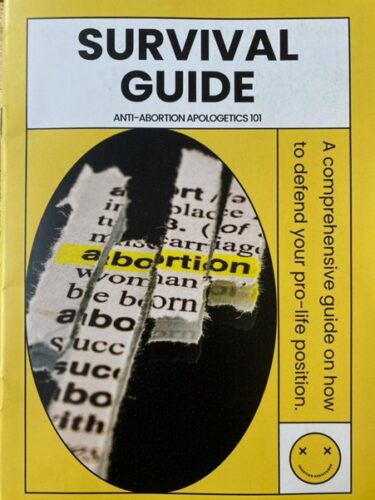
I asked, “So you’re a secular group?”, in my only honest question of the day, and he admitted they were really only secular in name, in an attempt to remain open across the spectrum. I could have guessed that, but it was good to avoid ambiguity. When I asked what the group did for young people, he told me about their social events and handed me a book entitled Anti-Abortion Apologetics 101. The book contains some clear and good advice about how to proselytise, such as: avoid being too anecdotal, avoid slogans, don’t get heated and try not to win the conversation.
It fed into a feeling I was starting to have across the room, that each group was trying to recruit me. Part of the persona I had taken on was that my church didn’t speak much about abortion. Again and again, I was praised for my bravery and guided on how best to be a foot soldier, without ever having to ask. This was likely because my cover story made me the perfect recruit: already a believer, but a complete blank slate.
I saw a lot during my day at March for Life that felt like a shift in tone from last year. For instance, last year I had a long conversation with a “natural cycles” birth control alternatives hippie woman; this year, her stall had been replaced by the ADF. Perhaps I was just paying closer attention this year, or because there have been changes in the world (or changes in myself), but I felt they were taking themselves more seriously this year. In the closing remarks of the final talk, they ended with the mantra: “I’ve seen the end of the book, and we win!” met with a standing ovation.
Last year I speculated that the movement was emboldened by the overturning of Roe v. Wade. Now I can safely confirm it, and see that they are also spurred on by Trump, who was mentioned a few times in passing as taking strides in the US that we will soon be following in the UK.
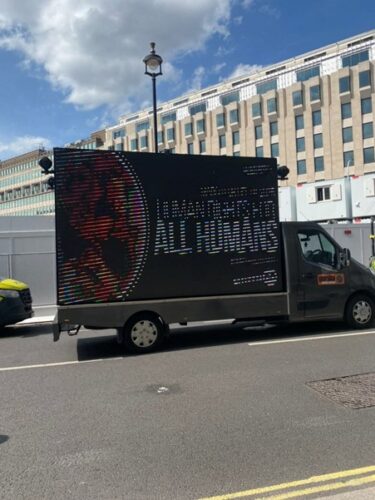
Citizen Go in particular had a representative who was very pleased that Trump was back in the Oval Office, implying that he hoped the UK would follow suit and appoint a leader who is vocally ‘pro-life’. He also, within a two-minute conversation, leapfrogged from condemning the dreaded Biden administration to complaining about the nefarious rise of gender ideology and secularism before ending with the ironically bipartisan, albeit from different perspectives, issue of the freedom-of-speech laws that came into effect in August.
To everyone in attendance, banning abortion in the UK is not a pipe dream but an inevitable future. While I think we are still very far from that reality, culturally in the UK it feels less like steady ground and more like the top of a steep incline that could quickly turn into a decline. The half-comfort I offered myself as I left was that our right-wing pundits, and those who boost their polling figures, have different priorities. For instance, nobody here is spray-painting babies onto roundabouts. However, I saw as a common theme, particularly from the young men present, that ‘pro-life’ was the springboard to talk about free speech, evangelicalism, and gender issues.
I had two key takeaways from the event, the first being that everyone there believed in ‘pro-life’, but for only half was this the extent of their views. The other half used abortion as a springboard to push other right-wing talking points, many of which I would argue are much more dangerous than being ‘pro-life’, or at least certainly have more support behind them.
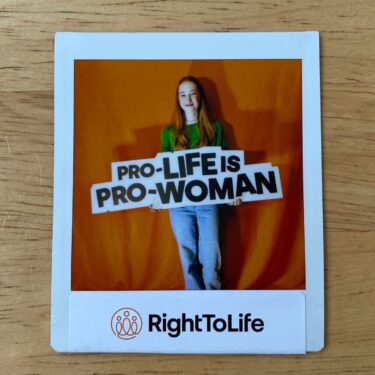
The other takeaway was, as outwardly emboldened as they might be, self-assured they are not. While I missed her talk, the live recording of Vaughan-Spruce’s speech urging us to sign a pro-life prophetisation pledge reeked of desperation. She spoke about mobilising everyone in the audience to go into their schools, workplaces, and families to trumpet the ‘pro-life’ message. Does a secure, confident organisation need to beg for so many foot soldiers?
The sheer amount of apologetics material I left with, predicting every potential argument and offering a ready-made rebuttal, led me to see them as holding the shield rather than the sword, perhaps not as confident in their victory as they like to say they are.



